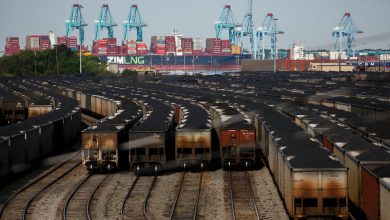How the Suez Canal Attacks Could Upend Global Trade


Maersk, the shipping giant, says it will reroute its vessels around Africa and away from the Suez Canal.Credit…Suez Canal Authority/via Reuters
The new shipping crisis that threatens world trade
Iranian-backed Houthi rebels in Yemen have continued to attack ships in the Suez Canal and the Red Sea, prompting shipping and energy giants to pause or reroute cargo and tanker ships.
The disruption has pushed up prices for oil, natural gas and shipping.
The U.S. and others are moving to defend ship traffic. Defense Secretary Lloyd Austin III announced on Monday the formation of a multinational naval force to escort merchant ships and oil tankers through the vital shipping route, which accounts for about 12 percent of world trade.
The Houthi violence, Austin said, “threatens the free flow of commerce, endangers innocent mariners, and violates international law.”
The intervention seemed to tamp down oil prices on Tuesday. But companies are taking no chances. Maersk said on Tuesday that it would redirect its vessels around Africa, a detour that could add at least a week to the journey. It comes a day after BP said it had halted all tanker traffic through the region.
And the shipping companies OOCL and Evergreen Line have paused sending container ships to Israel.
Exporters are bracing for shipping bottlenecks around much of the world. “You are going to see massive delays on your cargo,” Lars Jensen, the C.E.O. of Vespucci Maritime, a Copenhagen-based consulting firm, told DealBook. According to Reuters, the freight rate from various Chinese ports to Israel has spiked by more than $300 to more than $2,300 for a 40-foot container.
Rates, Jensen said, were unlikely to rise “to the disastrous levels that we saw two-and-a-half years ago.” But he does see the potential for global disruption, first hitting trade in the eastern Mediterranean before potentially reaching as far as ports in the U.S.
That would compound delays tied to the drought-stricken Panama Canal. Shipping companies have been forced to redirect shipments from Asia away from Panama and through the Suez Canal to ports on America’s East Coast. If the Suez troubles persists, Jensen said, it could lead to congestion issues around North America.
“If you’re trying to look at this from the Houthi perspective, so far, this seems to have been a smashing success,” Jensen said.
HERE’S WHAT’S HAPPENING
Tennessee sues BlackRock over its E.S.G. policies. The state’s attorney general accused the firm of violating consumer protection laws by not making clear whether it gives precedence to environmental, social and governance concerns over investment returns. BlackRock rejected the charge, but faces widespread E.S.G. opposition from other Republican-led states.
A union may complicate Nippon Steel’s $14 billion deal for U.S. Steel. The United Steelworkers, which represents most of the American company’s work force, urged regulators to review the deal on labor and national security grounds. The union has favored a deal with a domestic producer, Cleveland-Cliffs.
Trevor Milton is sentenced to four years in prison. Milton, the founder and former C.E.O. of the electric carmaker Nikola, was found guilty last year of defrauding investors. His trial, and that of Elizabeth Holmes of Theranos, were seen as tests for whether start-up founders could be held liable for making exaggerated claims to promote their company’s prospects.
Migrants entering Texas face arrest. Greg Abbott, the state’s Republican governor, signed the controversial measure into law on Monday, setting up a showdown with the Biden administration on border security. Immigrant-rights groups and Hispanic organizations argue that the measure is unconstitutional and encourages racial profiling.
Figma’s C.E.O. on his $20 billion deal’s demise
Among the several deals that have fallen apart recently, Adobe’s $20 billion takeover of Figma, an upstart design software maker, is among the most instructive.
The companies had promised it was a way to “usher in a new era of collaborative creativity,” but regulators in three jurisdictions saw it as an unacceptable effort by a software giant to buy a promising future rival. To Dylan Field, Figma’s C.E.O., that contrast underscored a fundamental divide between how businesses and regulators think of competition.
“It’s frustrating and sad that we’re not able to complete this,” Field, in his first interview since the announcement, told DealBook’s Michael de la Merced.
The deal’s demise is another feather in antitrust enforcers’ caps. Both the European Commission and Britain’s Competition and Markets Authority were preparing to formally challenge the transaction. (Just hours before the companies announced that the deal was dead, the C.M.A. said Adobe had refused to offer remedies to satisfy concerns.) The Justice Department — which met with Adobe and Figma representatives last week — had been weighing whether to oppose it as well.
Regulators’ biggest worry: Would allowing Adobe to buy Figma eliminate a future competitor? To some, the deal was analogous to Facebook buying Instagram in 2012. That concern has also underpinned other enforcement efforts, including those against Microsoft’s takeover of the gaming company Activision Blizzard and Meta’s acquisition of the virtual reality start-up Within. (Both of those deals closed.)
Field argued repeatedly that the deal would have enabled his company to create more offerings, but said on Monday that “ultimately there is some gap between how regulators understand our business and how we understand our business.”
By the weekend, it became clear the deal couldn’t succeed. In recent weeks, “we both have seen how the path has been narrowing,” Field said, and abandoning the transaction would provide more clarity and certainty to employees and customers.
What’s next? Regulators’ opposition to the Adobe deal means that Figma probably won’t be able to find another buyer, Field acknowledged, and the company probably would remain independent. He added that Figma had continued to expand during the past 15 months, more than doubling its work force to 1,300 and acquiring Diagram, an A.I.-based start-up.
Apple Watches and a fight over innovation
Apple’s announcement on Monday that it would halt U.S. sales of its newest smartwatches, one of its most popular gadgets, threatens to put a dent in its holiday sales.
The move, arising from a patent dispute with the medical technology company Masimo, further lifts the lid on a fight between Silicon Valley giants and smaller rivals.
The back story: Masimo, which produces health monitoring devices, accused Apple of poaching top executives and others involved with its technology for detecting users’ pulses — then including a similar feature on Apple Watches. It took its fight to the International Trade Commission, which ruled that the iPhone maker had violated Masimo’s patents.
Apple has denied the claims. Instead of seeking a licensing deal with Masimo, it has asked the Biden administration to overturn the I.T.C.’s decision. It’s also reportedly trying to find a software fix or other potential workarounds.
The stakes are high. Apple Watch sales account for $20 billion of the tech giant’s annual revenue. If the company can’t find a solution soon — the presidential review period ends on Christmas Day — it may face an import ban.
It’s not Apple’s only patent fight. Last year, the I.T.C. ruled that the company infringed on the EKG tech of AliveCor, another medical device maker, a decision that the Biden administration has declined to overturn.
Apple said the ruling isn’t effective yet because a separate agency has ruled that AliveCor’s tech isn’t patentable — a decision AliveCor is appealing.
Apple’s critics say the cases show how Big Tech is threatening innovation. Vinod Khosla, the venture capital mogul who is an AliveCor investor, applauded Apple’s decision to halt sales, arguing that start-ups are the backbone of America’s tech industry. “If this I.P. is not supported by laws, there is very little incentive for V.C.’s to fund breakthrough technologies,” he told DealBook.
“If the U.S.’s innovative companies are crushed by competitors who have infinitely large cash balances and can bully tiny companies into oblivion with incessant litigation, undue political influence and a media barrage,” Khosla added, “we will become a country run by a few monopolies and zero innovation.”
Another chip in Google’s wall
Google’s announcement on Monday that it will let developers offer direct payment options to its Play Store users is the latest sign that the fight against Big Tech is taking a toll.
The news, revealed as part of a $700 million antitrust settlement with all 50 states reached in September, further erodes Google’s business defenses. The question is whether more hits are to come next year.
Google’s app store has been in legal cross hairs for some time. Along with Apple’s platform, it’s one of the two main mobile app marketplaces. Google charges the developers between 15 percent and 30 percent for in-app purchases and subscriptions, a practice that smaller companies have called unfairly onerous.
The Play Store was in the news last week after a San Francisco jury found that Google violated antitrust laws with its tight control of the marketplace, in a lawsuit filed by Epic Games.
What’s in the settlement: Developers’ fees to Google will be reduced by four percentage points when they handle their own transactions. (Users won’t necessarily pay lower prices, however, as companies may pocket the difference.) Google will also pay $630 million to create a consumer settlement fund and pay $70 million into a fund for states.
The tech giant hopes that the agreement can serve as a template for other resolutions, including with Epic. A judge is expected to decide on remedies in that case early next year; Google says it will appeal the Epic ruling.
Google faces other legal challenges. A judge will rule on the Justice Department’s antitrust lawsuit over the company’s monopoly in search as another case looms about its dominance in advertising.
Have you read a book, listened to a podcast, or watched something this year that changed how you think about deals, leadership, or the intersection of business and policy?
Tell us your favorites here. We’ll share the best ones in an upcoming newsletter.
THE SPEED READ
Deals
-
IBM agreed to buy an enterprise division of Software AG, a German tech company owned by the investment firm Silver Lake, for $2.3 billion. (Reuters)
-
Nio, a Chinese electric car maker, secured a $2.2 billion investment from an Abu Dhabi firm. (FT)
-
Farfetch, the embattled luxury e-commerce platform, will sell itself to Coupang for $500 million. (NYT)
Policy
-
“Why Central Banks Should (but Might Not) Keep the Market Flooded With Money” (WSJ)
-
How a new anti-gay law is hurting Uganda’s economy. (NYT)
Best of the rest
-
OpenAI said its board could stop the release of new artificial intelligence models even if the ChatGPT’s top executives have deemed them safe. (Bloomberg)
-
Marvel Studios has cut ties with Jonathan Majors, the actor once set to be the linchpin of its next series of movies, after he was convicted of misdemeanor assault and harassment. (Variety)
-
Goldman Sachs has hired Jennifer Zuccarelli, a former top communications executive at JPMorgan Chase and the Treasury Department, as its head of media relations. (Internal memo)
We’d like your feedback! Please email thoughts and suggestions to [email protected].




